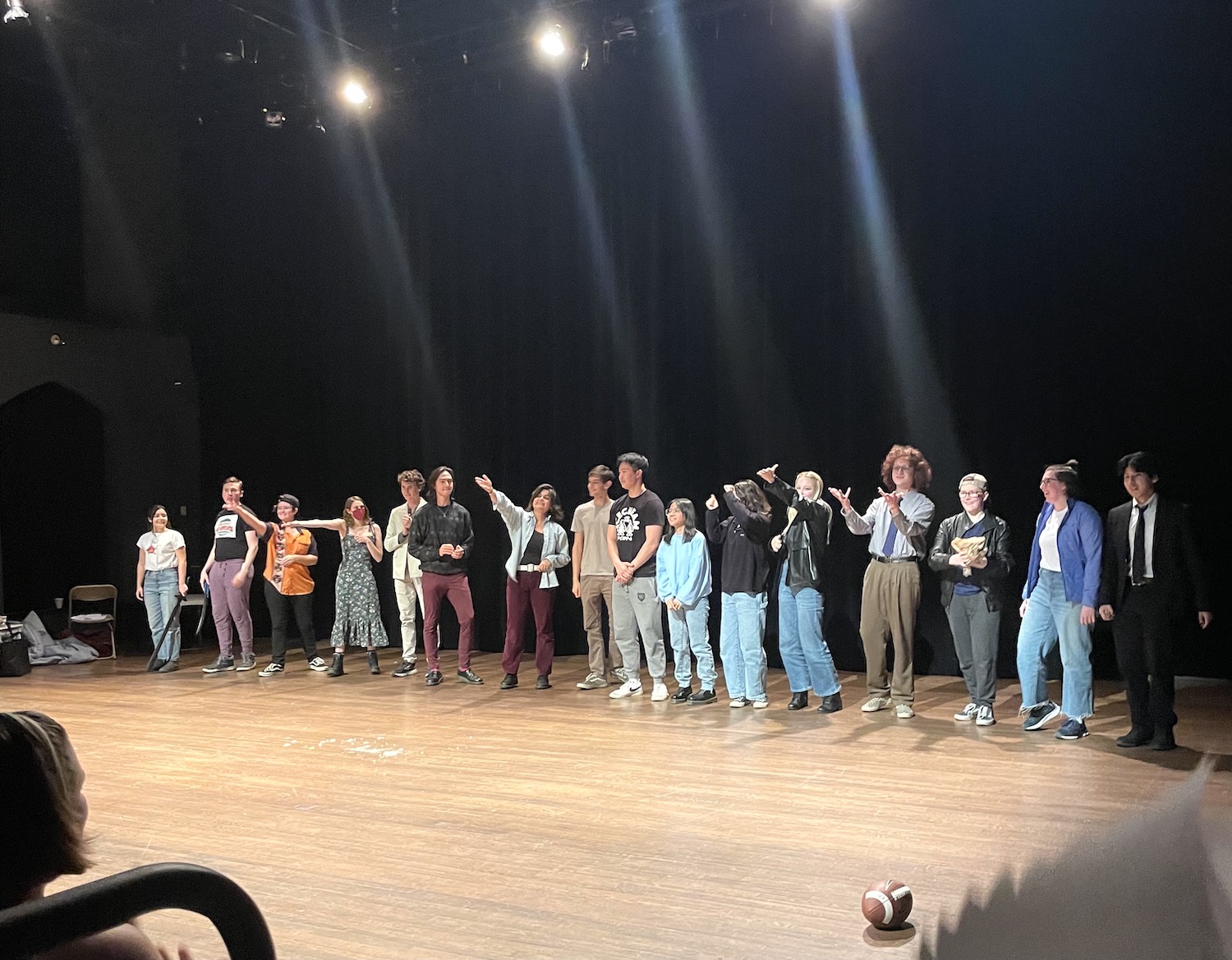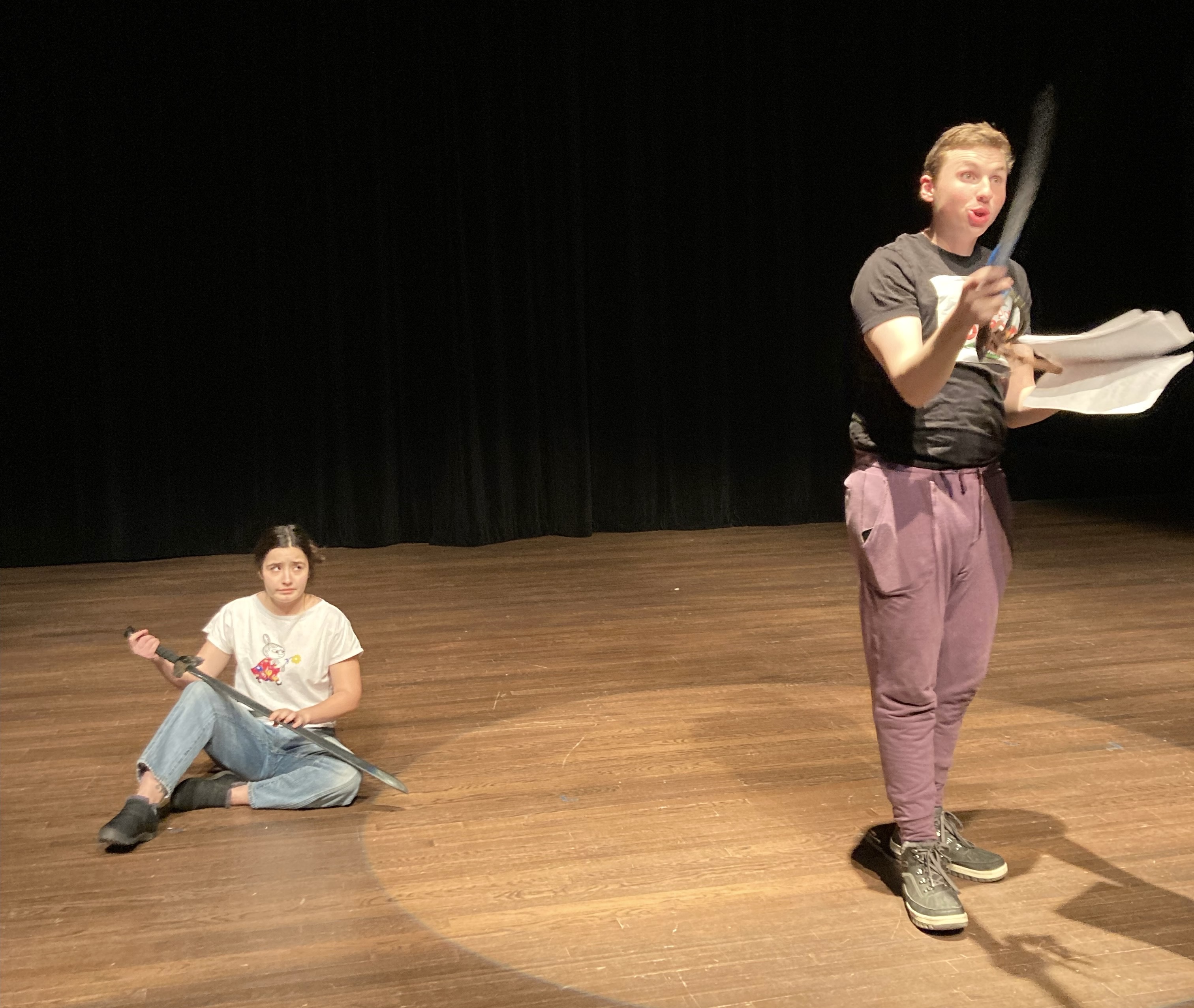
Second Stage was, for nearly half a century, a household name at the University, synonymous with student-run theater and taste-making performances. For many current and past students, Second Stage was an essential part of the University’s advertising, with big-league hitters sharing their work as part of the organization; Lin-Manuel Miranda ’02 famously debuted his Tony-winning musical “In the Heights” in the Patricelli ’92 Theater under Second Stage’s supervision.
On Friday, Sept. 17, 2004, Theater Reviewer Liz Thaler ’05 published an article in The Argus entitled “Who is Second Stage?” to reintroduce the campus community to this giant of student theater.
“There are a lot of shows at Wesleyan,” Thaler wrote. “You know, ‘theater.’ After all, we’ve got a whole department for it, yes? Theater faculty put on about three shows a year, plus two or three senior theses. So what about the other 15–20 shows that tend to happen here? Enter Second Stage.”
Then, a series of blows—controversy around racial homogeneity in casting, rigid power structures and unforgiving leaders, and, perhaps most significantly, the COVID-19 pandemic—yanked the group out of the picture, leaving a void in the student theater scene.
“I do remember…learning about Second Stage [while touring Wesleyan],” Spike Tape Marketing Manager Luka Netzel ’24 said. “Obviously with COVID, I think there was an expectation that theater’s going to be weird.… But [by sophomore fall] it was more disheartening. There was a point where I had kind of a realization that, ‘Oh, there is just no student theater right now.’”
Enter stage left: Spike Tape, the new face of student theater at the University. While similar to Second Stage at first glance, there are some significant differences between the two. Namely, Spike Tape’s generally hands-off philosophy with the design and production process stands in contrast to the more approval-based methods that Second Stage employed, according to Thaler.
“The student producers put together their own teams of designers, technicians, and, of course, actors, and we oversee them while they do their thing,” Thaler writes. “Overseeing entails approving their designs and their spending, monitoring their progress at our Monday meetings, helping to put up risers and to strike each show.”
Spike Tape President and Co-Founder Charlotte George ’24 emphasized that the group aims not to control, oversee, or manage the creative processes of a show, but rather to provide necessary resources.
“Basically, people who are interested in putting on a production will bring that to us and propose it,” George said. “[We] select a season of productions based on those proposals, and then we will help them acquire funding, we’ll help them get a venue, we’ll provide them with resources for directors and tech and that kind of stuff. So we just serve as a facilitating force without having any control over creative autonomy and just serve as a producing body.”
Spike Tape Co-Founder Drew Weddig ’24, who is a member of the Spike Tape Well-Being Board, noted the new organization’s refocus on the students producing theater, rather than just the shows themselves. Weddig also emphasized Spike Tape’s hope to share the spotlight with other potential student theater groups on campus.
“A big part of the foundation of Spike Tape has been to really try and set up a foundation for the future of Spike Tape to really prioritize people over production,” Weddig said. “Another big part was that we don’t want Spike Tape to have a complete monopoly over the theater world at Wesleyan, and so we’ve been also trying to encourage other groups to get things going.”
In Thaler’s article, while Second Stage is noted as collaborating with the University and the Center for the Arts (CFA) on the production end, no shared space with other student groups was mentioned.
“More fortunately, we are not alone,” Thaler wrote. “We have wonderful support from the Theater Department—especially Department Chair Jack Carr, CFA Scenery Specialist Charlie Carroll and CFA Lighting Specialist Suzanne [Sadler]—and the opening of the renovated ’92 brought us Facilities and Event Manager Ed Chiburis, our newest Guardian Angel.”
Indeed, many students felt that Second Stage never wanted to share the theater scene with other organizations, prompting the creation of the Student Performing Arts Resource Committee (SPARC)—separate from Spike Tape—to manage the affairs of the ’92 Theater.
Now, in just a single year of existence, Spike Tape has already become the predominant name in Wesleyan’s theater scene.
“We decided to make our first big production a musical showcase, where students could sign up to sing songs from musical theater,” Spike Tape Vice President and Co-Founder Kyra Kushner ’24 wrote in an email to The Argus. “While we only planned to produce that event, a student named Lonnie Miller approached us and asked if we could help produce her original play. From there, two other students approached us, and we ended up producing three full shows—“Inheritance,” “Horse Girls,” and “The Importance of Being Earnest”—as well as a successful musical showcase in our first semester! This great first season brought us a lot of attention, and a lot of students decided to join the club.”

Since then, the club has grown exponentially. In Fall 2022, Spike Tape put up four shows: “Assassins” (the first full-length musical performed in the ’92 since the COVID-19 pandemic began), “The Masquerade,” “The Boys in the Tower,” and “Untitled Christmas Special.” Now, they’re preparing to enter their busiest semester to date with nine productions slated for the next three months.
“Initially, I felt very stressed because in the past we’ve had difficulty getting people to fill certain roles, especially technical roles,” George said. “I was worried that we wouldn’t be able to fill every role, but we have been a lot better about outreach and making sure that we are reaching out to people who’ve never heard of Spike Tape before.”
While this number is just shy of the 15–20 shows that Thaler wrote Second Stage would produce each semester, it’s an indication of just how much demand there was—and still is—for a student-run theater on campus.
“There are, I believe, two thesis shows that have casts, and then there’s also the department show, so we were a little worried about whether we [would] even have enough people,” Netzel said. “But pretty much every show had their audition slots filled. There’s tons of people.”
As Spike Tape leaders adjust to the organization’s new size and scale, they have worked to rethink its organizational structure. In the weeks leading up to the Spring 2023 semester, the group held an organization-wide Winter Summit.
“When we first founded it, it was just me and the three other founders [Kushner, Weddig, and Amanda Morris ’24] figuring things out and just delegating,” George said. “It was very unstructured and we were like, ‘We’ll figure out what the structure is later on.’”
One thing that the founders remained very cognizant of as they thought about how to create and organize Spike Tape was the nature of creative and logistical power in student theater.
“We [wanted] to avoid a hierarchical structure because we knew in the past that Second Stage had an issue with [cliquishness] and establishing certain staffers as the people who have control over the club without allowing people in the club to really have a voice in what’s happening,” George said. “So we wanted to go into that immediately, eliminating anything that could potentially lead to that. Then last semester we ended up having elections for specific board positions, and it was a lot more casual.”
At the Winter Summit, the group’s official boards, positions, and purposes were clearly laid out, with an emphasis placed on prioritizing people over production.
“Spike Tape is organized by a board of people that try to smoothly run the club, allowing different people to hold different positions, such as a Communications Manager, Archivist, Technical Director, Well Being Board, Marketing manager, House manager etc,” Kushner wrote. “A huge part of our growing process has been revision—we asked ourselves what worked the previous semester, what didn’t work? Then, we try to act accordingly and improve. It’s been a huge learning process and a great joy to figure out. As of this semester, we have a full constitution and are looking to still expand!”
This sort of logistic-focused organization seems to build on Second Stage’s structure, although the latter included a greater amount of input from the club onto casting, direction, and acting.
“Second Stage members shift positions around every now and then and most people on staff have their own area of knowledge, not just as staff members but as theater people in general,” Thaler wrote. “We’ve got actors, directors, designers, stage managers, all of the above and none of the above.”
The culture within this group, Weddig recalled, was one of the issues associated with Second Stage at its downfall.
“It became a very elitist organization that would only cast white people who had training in theater, which was crazy,” Weddig said.
Not all pieces of the former Second Stage were scrapped, however. For Weddig, one important thing that the group carryied over from Second Stage was the vast treasure trove of resources that it left behind.
“[Second Stage had] bibles for each part of production,” Weddig said. “They also have a pretty extensive like constitution and guidelines for how to deal with resources in the ’92, which we have shunted over away from Spike Tape—because, again, we want to encourage other student theater groups to have a presence—to SPARC, which is a completely different like committee as opposed to a club.”
When asked to think about the future of Spike Tape and its place in Wesleyan’s history, Kushner put forward Spike Tape’s goals of expanding safe, equitable, and exciting student performances.
“Spike Tape wants to be open to anyone and encourages everyone to take part, whether it be on the creative or production end,” Kushner wrote. “In 19 years, I hope people are still upholding that same value. I truly hope Spike Tape, or something similar still exists and is creating a safe space for student theater.”
For Netzel, the transparent and open-access nature of Spike Tape is the highlight. They noted the myriad of opportunities available for students to weigh in and participate.
“I think the dream and the goal…is transparency,” Netzel said. “There’s no board meetings, our weekly meetings are open to everyone. We email everyone on the list service [and] say here’s the agenda. You can bring up something if you want. Our goal every semester has just been outreach, trying to make sure more people are aware…. If you want to and you care and you have a passion for student theater, then you have the right and you have the ability to get involved. So yeah, I hope it stays strong for 19 years.”
George stressed the importance of Spike Tape’s founding philosophies and how integral they are to every aspect of the club’s function.
“I hope it’s still around and I hope that it has maintained a structure that’s inclusive to students,” George said. “Because if it’s still around but it’s reached a point where it’s become exclusive, I don’t think that’s worth it.”
Sam Hilton can be reached at shilton@wesleyan.edu.
“From the Argives” is a column that explores The Argus’ archives (Argives) and any interesting, topical, poignant, or comical stories that have been published in the past. Given The Argus’ long history on campus and the ever-shifting viewpoints of its student body, the material, subject matter, and perspectives expressed in the archived article may be insensitive or outdated, and do not reflect the views of any current member of The Argus. If you have any questions about the original article or its publication, please contact Head Archivist Sam Hilton at shilton@wesleyan.edu.


Leave a Reply